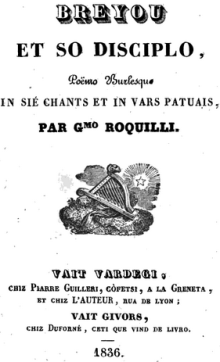Guillaume Roquille
| Jean Guillaume Roquille | |
|---|---|
| Born |
26 October 1804 Rive-de-Gier, Loire, France |
| Died |
1 February 1860 (aged 55) Rive-de-Gier, Loire, France |
| Nationality | French |
| Occupation | Tinsmith |
| Known for | Franco-Provençal poetry |
Jean Guillaume Roquille (26 October 1804 – 1 February 1860) was a French tinsmith and poet who wrote in the Franco-Provençal language. Some of his work was burlesque, but much was serious commentary on the wretched conditions of the working people in the industrial regions of the Saint-Étienne basin and Lyon.
Life

Jean Guillaume Roquille's birth in Rive-de-Gier, in the industrial Gier valley between Saint-Étienne and Lyon, was recorded on 26 October 1804. His father was a crocheteur (porter) on the canal in Rive-de-Gier. He grew up in a humble household and received only basic education. He became a tinsmith by profession.[1]
Guillaume Roquille published a number of texts in the Franco-Provençal language in the 1830s, often commenting on events of the day.[2] His criticism of the brutal suppression of the 1834 silk workers revolt in Lyon earned him prosecution for a misdemeanor, although his detailed account of the police provocation and the massacres appear to be accurate.[3]
The police archives record that he was hawking "subversive" literature in Valence and Grenoble in support of the striking miners in 1844, and he had to leave Rive-de-Gier in 1846. He was not in Rive-de-Gier during the "red revolt" of 1849. He returned under the Second French Empire (1852–1870), resigned and now conformist.[2] In his last years he was a janitor in a factory.[3] He died in hospital in 1860 at the age of 56.[2]
Work
Guillaume Roquille published two long texts in patois at Rive-de-Gier: Breyou et so disciplo (1836) and Lo Pereyoux (1840). These are difficult to find today. At that time, writing poetry in the patois used in day-to-day speech was very unusual, and publishing without a translation was a bold step. Educated people often though of patois as being suitable only for jokes or comic plays.[4] Although he knew French well, he chose to write in dialect to have a more direct effect on his audience, for his work was clearly intended to be read aloud.[2]
His choice of subjects was also unusual, often dealing with current political issues.[4] In 1835 his collection Ballon d’essai d’un jeune poète forézien (Trial balloon of a young Forézien[lower-alpha 1] poet) violently attacked the arrival of the Saint-Étienne–Lyon railway, which would ruin the Givors canal from Rive-de-Fier to Givors on the Rhone on which his father worked as a porter. In 1836 he published a long piece Breyou et so disciplo in which he criticized the savage suppression of the Lyon silk workers' revolt in 1834. He supported the Rive-de-Gier miners' strike of 1840, mocking the authorities at a time when workers' associations and strike were forbidden.[2] He published a long poem in French, Les Victimes et le Dévouement, in which he described the death of thirty-two Rive-de-Gier miners in a hydrogen gas explosion on 29 October 1840.[5]
Roquille was a remarkable witness to his times, with a caustic wit and rage against injustice and the misery of the working classes. He was also an excellent rhymer in both French and Franco-Provençal.[6] His work was often, by his own admission, far from serious. For that reason, and because of his anarchist and anti-clerical views, it never achieved fame beyond the Rive-de-Gier region.[3]
Bibliography
- Roquille, Guillaume (1835). Ballon d’essai d’un jeune poète forézien.
- Roquille, Guillaume (1836). Breyou et so disciplo: poêmo burlesquo in sie chanto et in vars patuais. P. Guilleri. Retrieved 2013-08-23.
- Roquille, Guillaume (1838). Lo Députò manquò, poëmo ein patuais de vait Vardegi, par Gme Roquille. Point. Retrieved 2013-08-23.
- Roquille, Guillaume (1840). Les Victimes et le Dévouement, narration en vers de la fin tragique de trente-deux mineurs dans un puits de l'exploitation de l'Ile-d'Elbe, à Rive-de-Gier, foudroyés par le gaz hydrogène le 29 octobre 1840. l'auteur. Retrieved 2013-08-23.
- Roquille, Guillaume (1843). La Ménagerie, ou le Grand combat d'animaux, poème burlesque et allégorique, par Guillaume Roquille. Nourtier. Retrieved 2013-08-23.
- Roquille, Guillaume (1856). Lé Ganduaises, poésies patoises, par Guillaume Roquille,... impr. de J. Nigon. Retrieved 2013-08-23.
- Roquille, Guillaume (1857). La Gorlanchia: poésies patoises. Nigon. Retrieved 2013-08-23.
- Roquille, Guillaume (1857). Lo Pereyoux, poème burlesque, en patois de Rive-de-Gier. J. Nigon. Retrieved 2013-08-23.
- Roquille, Guillaume (1858). Discours en vers patois, prononcé dans une grande assemblée, présidée par M. Petin, maire de la ville de Rive-de-Gier, par Guillaume Roquille. impr. de L. Perrin. Retrieved 2013-08-23.
- Roquille, Guillaume (1859). Lo Procès pardzu, poëmo ein patuais de vait Vardegi, par Guillaume Roquille. impr. de L. Perrin. Retrieved 2013-08-23.
- Roquille, Guillaume (1883). Oeuvres complètes. J. Besseyre et Cie. Retrieved 2013-08-23.
- Roquille, Guillaume (1995). Anne-Marie Vurpas, ed. Le carnaval des gueux: conscience ouvrière et poésie burlesque : édition critique avec traduction et glossaire des œuvres complètes de Guillaume Roquille (1804-1860) en patois de Rive-de-Gier (Loire). Programme pluriannuel en sciences humaines. ISBN 978-2-7297-0542-8. Retrieved 2013-08-23.
References
Notes
Citations
- ↑ Roquille & Merle 1989.
- 1 2 3 4 5 Merle 2013.
- 1 2 3 Stich 1998, p. 193.
- 1 2 Merle 2004.
- ↑ Bibliographie de la France 1841.
- ↑ Stich 1998, p. 194.
Sources
- Bibliographie de la France ou Journal général de l'imprimerie et de la librairie et des cartes géographiques, gravures, lithographies et oeuvres de musique. Pilet. 1841. p. 404. Retrieved 2013-08-23.
- Merle, René (April 2004). "Guillaume Roquille (auteur francoprovençal, parler de Rive-de-Gier)". L’Araire. Archived from the original on 2006-01-07.
- Merle, René (2013). "Guillaume Roquille (1804–1860): avant-propos". Archived from the original on 2013-09-14. Retrieved 2013-08-23.
- Roquille, Guillaume; Merle, René (1989). Luttes ouvrières et dialecte (Rive-de-Gier 1840). S.E.H.T.D. Retrieved 2013-08-23.
- Stich, Dominique (1998-01-01). Parlons francoprovençal: une langue méconnue. L'Harmattan. p. 193. ISBN 978-2-7384-7203-8. Retrieved 2013-08-23.